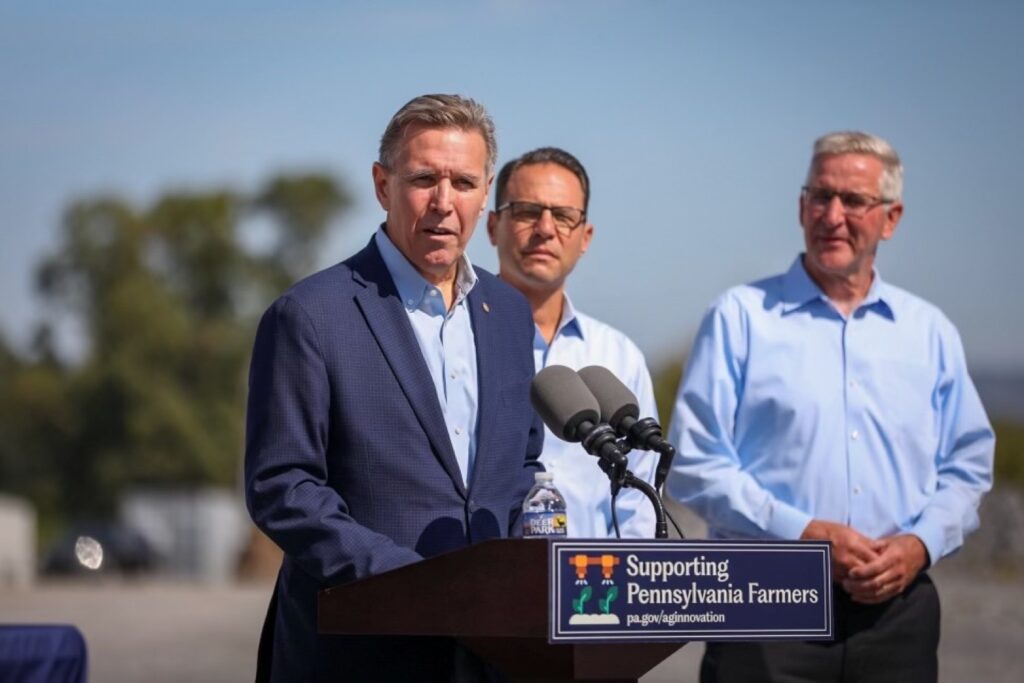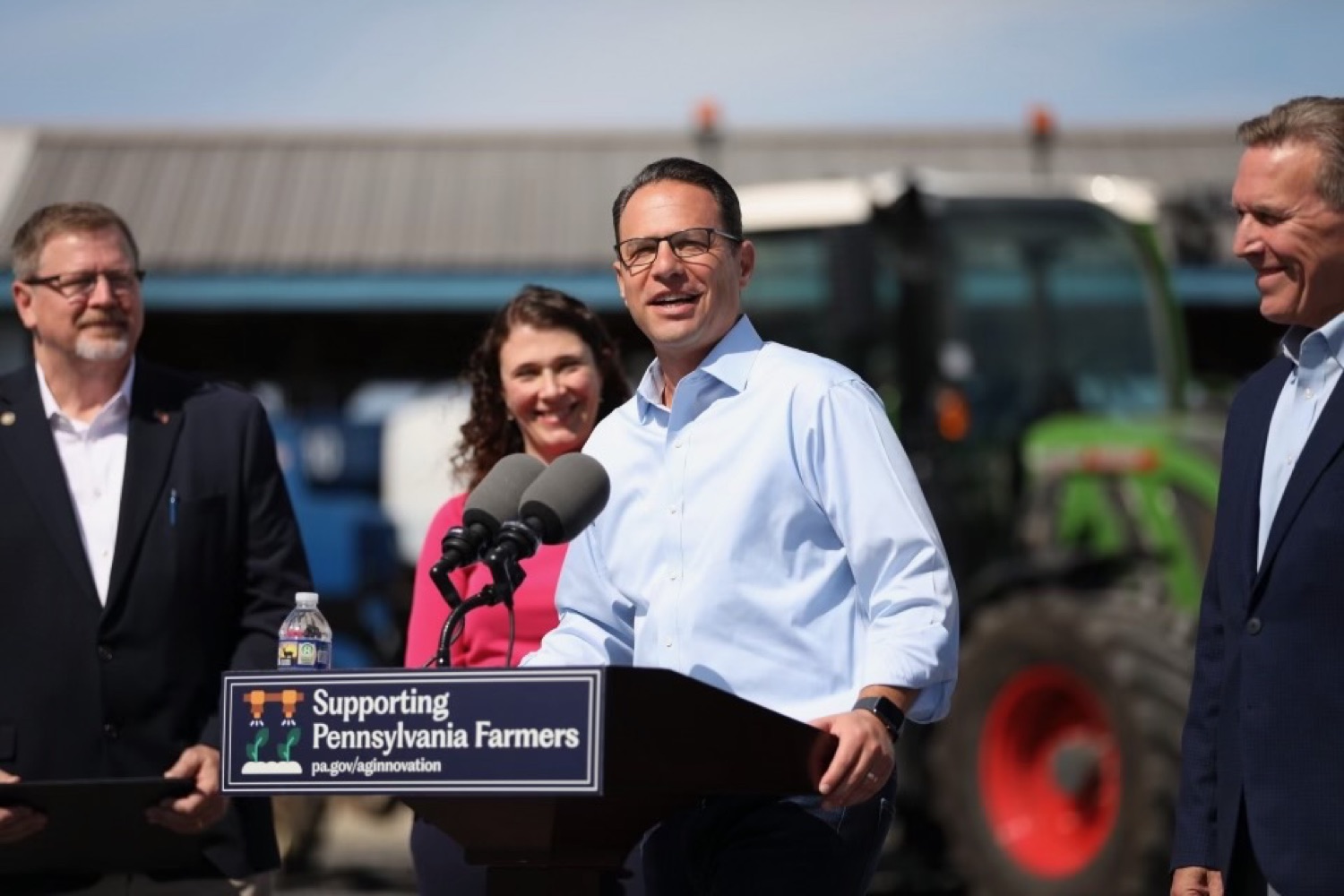Gov. Josh Shapiro visited Penn State on Monday to discuss the commonwealth’s investments in agricultural research and production, including a new $10 million innovation fund championed by a local state representative to support farmers and boost the ag industry in Pennsylvania.
Shapiro, who made agriculture one of the five pillars of his administration’s comprehensive economic development, said the innovation fund is the first of its kind at the state level in the nation.
“I think a lot about economic opportunity running through the farmlands of Pennsylvania and the kind of cutting-edge research that happens right here at Penn State when it comes to agriculture,” Shapiro said while speaking before a ceremonial bill signing at the Dairy Research and Teaching Complex.
“When I think about innovation, I don’t only think about the life sciences centers in Philadelphia or Pittsburgh or the sprawling suburban office parks where innovation is occurring,” “I think about farms and centers like this in rural communities all across Pennsylvania.”
House Bill 2301, the legislation creating the Agricultural Innovation Fund, passed with bipartisan support. It creates a matching grant program for “farmers, food processors, cooperatives and technical service providers to adopt innovative practices and technologies that will make them more efficient, profitable and sustainable, while also benefiting the the environment and our climate,” said state Rep. Paul Takac, D-College Township, who was the prime sponsor of the bill.
Grants are available to individual farms, businesses and projects of regional impact. The program will be administered by the Department of Agriculture, in consultation with the State Conservation Commission, and the final determination on awards will be made by an independent board.
Pennsylvania has more than 53,000 farms that support over 600,000 jobs and contribute $132 billion to the state’s economy, and, Takac said, the commonwealth’s farmers have a long history of embracing new technology and practices to improve production and environmental stewardship.
But, Shapiro said, Pennsylvania had had not been “aggressive enough when it comes to competing with other states and other nations,” and Takac noted that the pace of research and innovation is “rapidly accelerating,” presenting vast new opportunities and challenges.
“So it’s vitally important that we help Pennsylvania farmers and companies take full advantage of these new technologies and these best practices,” Takac said.

Penn State College of Agricultural Sciences Dean Troy Ott said the fund will support initiatives that “ensure competitiveness, resiliency, environmental stewardship and vitality for farms and agribusinesses in the Commonwealth,” with innovations that increase production efficiency, encourage sustainable practices, utilize renewable energy and sequester carbon.
“This is exciting for me from my perspective as Dean of the College of Agriculture and as a scientist because it represents the tangible impact of research done at Penn State and other land-grant universities around the country,” Ott said. It is a legacy of a partnership between Penn State and Pennsylvanians more than 150 years old to discover and implement science-based solutions to improve agriculture.
Ott pointed to research developments near where he spoke at the Dairy complex: a precision feeding system to provide custom diets for cows’ nutritional needs without wasting feed; an interseeder, designed to increase the use of cover crops, reduce runoff and preserve moisture in soil; a new methane digester that uses manure from our dairy and swine operations to generate energy; and many more.
“I could go on and on describing the myriad ways that Penn State is providing solutions to farmers in Pennsylvania, the nation and around the globe,” Ott said. “What is most important to remember is that we would not be here talking about implementing new technologies were it not for state support received for agricultural research that enabled our scientists to ask ‘what if?’”
Christina Grozinger, professor of entomology and director of the Technology for Agriculture and Living Systems Center, is among those at Penn State leading efforts to develop research collaboratively with farmers.
“Pennsylvania has one of the most diverse farming systems in the nation, and so this provides many opportunities for research and for innovation,” Grozinger said. “That is why we’re very excited about the Agriculture Innovation Fund. It will drive the growth of small businesses that will take our research and turn it into tools that farmers can use. And it will also create a community of farmers that know how technology can be used on their farms, and who we can work with later as we start developing new research projects and new innovations.”
The commonwealth’s 2024-25 budget is “extraordinary” for agriculture, with funding for a Western lab, continued money for agricultural conservation for clean streams, recovery funds in the event that farmers are impacted by high-path avian influenza and new food security support, Secretary of Agriculture Russell Redding said.
“But among that, we also now have, for the very first time, an Agricultural Innovation Fund,” Redding said. “And as the dean noted, we have done the research. We know what works, but we’ve never been able to take the next step to invest in the innovation. And you couple that with the economic development strategy of the governor, you look at where we are in terms of our productivity and the needs of the state and where we’re leading and the Innovation Fund becomes the answer.”
The Innovation Fund, which Takac noted is his first legislation as primary sponsor to be signed into law, starts this year with $10 million, but he is hopeful that it will grow in the coming years.
Grant guidelines and application procedures will be published on Sept. 28 at agriculture.pa.gov. Applications will then be open Sept. 30 through Nov. 26.
“We’re really proud of the fact that that $10 million isn’t just conceptual, isn’t just something down the road, but it’s something that we’re going to get out into our farmland beginning later this month,” Shapiro said.



